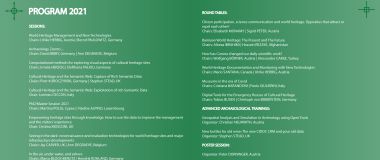of the 25th International Conference on Cultural Heritage and New Technologies November 4-6, 2020 | Vienna, Austria The 25th international Conference on Cultural Heritage and New Technologies took place in 2020 in the city hall of Vienna under the headline “Artificial Intelligence – New Pathways Towards Cultural Heritage”. The contributions deal with the application of computational approaches in all fields of cultural heritage, with a special emphasis on the utilisation of “Artificial Intelligence”. The topics include Remote Sensing, Data Acquisition and Modelling, and Methods for the analysis and presentation of digital data in archaeology and cultural heritage. The volume also contains Abstracts on the round table discussions held and the posters presented at the conference and a special session which was dedicated towards the 25th anniversary of the conference. CHNT25 | Proceedings 2020 (Download – 22MB) Propylaeum Information Service Classics made it available for download here: https://books.ub.uni-heidelberg.de/propylaeum/catalog/book/1045?lang=en ...
Read MorePublication formats for the Proceedings of CHNT 27 I 2022
Presenters and session chairs who participated in CHNT 27 have the possibility to publish their contributions in the proceedings of the conference. From 2019 on, the proceedings of the Conference on Cultural Heritage and New Technologies are being published as an e-book series on propylaeum, the information service for the classics in Heidelberg. The book and all of its papers will be available permanently with persistent identifiers (doi). The papers or the whole book will be available there in open access under a creative commons license. There are two formats for publishing in the proceedings: Papers and short papers. Papers Papers are intended to present new research and best-practices concerning methods, technologies and their application in the cultural heritage sector as well as thorough discussions of their impact and theoretical implications in the field. The papers are subject to single-blind peer-review by external reviewers and members of the scientific committee of CHNT. Short Papers Short papers provide the opportunity to present a wide range of topics, ranging from the presentation of new projects, preliminary reports or the exchange of experiences and smaller tweaks in the application of already established methods and technologies. Short papers are reviewed by the session chairs and the editorial team of...
Read Moreschedule
CHNT 26, 2021 I Proceedings
The deadline for submissions to the Proceedings of CHNT 26 has passed. We thank all authors for their submission and are currently working to publish the Proceedings as soon as possible.
Read MoreSession types at CHNT 27 I 2022
CHNT offers different formats for the presentation of research, networking, exchange of experience and ideas as well as more informal discussions and workshops to practice application skills. Sessions Sessions are the place to present current research towards the application of technologies in research, management and presentation of cultural heritage. They usually consist of a series of lectures of max. 20 minutes. The contributions can be published as papers or short papers in the proceedings. Round tables The focus of the round tables is more on discussion on current topics in the field, furthered by short talks on the topic of about 5 to 10 minutes, that can be published as short papers in the proceedings. Birds-of-a-feather-sessions This new format is intended as a platform for a more informal exchange on specific applications and special interest topics in the field. There are no formal requirements for the contributions to these sessions. The chairs of sessions, round tables, and birds-of-a-feather-sessions are invited to publish a summary of their session or round table as a paper or short paper in the proceedings. Advanced cultural heritage training workshops The advanced cultural heritage trainings are hands-on workshops, where state-of-the-art methods and technologies are showcased and can be practiced by all participants. The duration is about 2-3...
Read More


